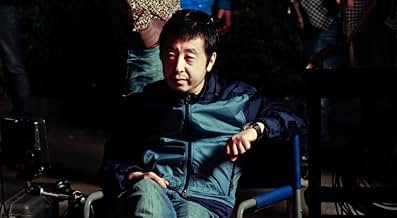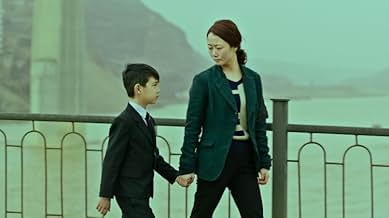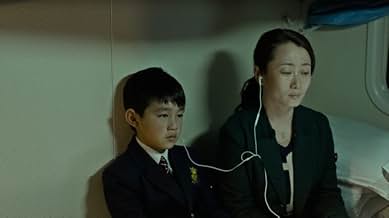IMDb रेटिंग
6.9/10
6.6 हज़ार
आपकी रेटिंग
अपनी भाषा में प्लॉट जोड़ेंThe life of Tao, and those close to her, is explored in three different time periods: 1999, 2014, and 2025.The life of Tao, and those close to her, is explored in three different time periods: 1999, 2014, and 2025.The life of Tao, and those close to her, is explored in three different time periods: 1999, 2014, and 2025.
- पुरस्कार
- 26 जीत और 42 नामांकन
Yi Zhang
- Zhang Jinsheng
- (as Zhang Yi)
Zijian Dong
- Zhang Daole aka Dollar
- (as Dong Zijian)
कहानी
क्या आपको पता है
- ट्रिवियाSome sequences (in the 1999 segment) were filmed by the director and the cinematographer back in 2001.
- गूफ़The young boy who plays Tao's son in 2014 is also part of the crowd of children that watches her perform at the new year's celebrations in 1999.
- क्रेज़ी क्रेडिटThe title appears more than forty minutes after the beginning of the movie.
- साउंडट्रैकGo West
Written by Henri Belolo, Jacques Morali and Victor Willis, Neil Tennant and Chris Lowe
Performed by Pet Shop Boys
फीचर्ड रिव्यू
Jia Zhangke is a prominent figure in contemporary world cinema as one of the leading directors of the so-called sixth generation of Chinese filmmakers. He has become known for his personal films which discuss social transition in modern China through the experience of the individual. Zhangke's latest film "Mountains May Depart" (2015) continues this in an essential, if not exactly surprising, fashion. Like "A Touch of Sin" (2013) and "Still Life" (2006), the film has an episodic structure, but narrative is much more conventional and straight-forward. While there is a lot of change in narrative focalization, "Mountains May Depart" is strongly structured around the protagonist Tao, played by the director's muse Tao Zhao, whose life unfolds before us in three distinct periods: 1999, 2014, and 2025. Thus Zhangke takes a look behind, reflects on the present, and anticipates the future of the Chinese society.
As a social film, "Mountains May Depart" studies the individual in the grip of a changing world. It tackles the difficulty of communication to the extent where parents need interpreters to talk to their children. Globalization, capitalism, and the new freedom of the 21st century do not offer comfort or help, but rather appear as rootlessness, alienation, and solitude in the lives of people.
All of Zhangke's films are, more or less, about change, but in "Mountains May Depart" this theme manifests itself clearly on the level of style and narrative. Zhangke's narrative includes a modernist combination of perspectives, creating a simple complexity which is never disorienting, as different characters are followed throughout the film, enhancing a pluralist sense of multitude and change. While Zhangke's style has been known as consisting of long takes and complex camera movement, "Mountains May Depart" presents a greater variety in style. Zhangke's camera keeps a short distance to the characters, mainly on the level of the medium shot, but there are also memorable establishing extreme long shots which highlight the minuteness of the individual in a vast landscape. The camera does move a lot, though perhaps subtly, but the editing rhythm is not strikingly slow. One of the most conspicuous stylistic elements of the film is the changing aspect ratio. The first episode is shot in the letterbox 4:3 ratio, the second in the contemporary standard 16:9, and the last in the widescreen format 2.35:1. This constant widening of the aspect ratio of the image reflects not only the globalization of the Chinese society and the characters moving outside of their homeland but also a more primordial experience of change that is constant in human existence. It embraces the Heraclitean flux.
Thus Zhangke poeticizes the experience of change in a cinematic fashion; that is to say, he utilizes cinematic means to articulate a profound, existential experience of change. This he does by combining features that change (the aspect ratio, the focalizing perspective) with perpetual elements such as recurring songs ("Go West" by Pet Shop Boys), dramatic motifs (the dog, the keys), and the intimate cinematography. Like the characters, Zhangke's style and narrative seem to be searching for a red line, something that gives meaning and coherence in a world of change.
While "Mountains May Depart" might feel like a minor work in Zhange's oeuvre, it does redeem itself for a patient spectator. Like Zhangke's other films, it too looks at the contemporary Chinese society, the inevitable transition from the perspective of the individual, and modern identity in an ever-changing world. Although there certainly is sadness to all this, Zhangke's film is also quite optimistic and bright in comparison to his previous, darker film "A Touch of Sin". Mountains may depart -- the very borders of the image may broaden -- but something will endure. It is, in fact, as if higher levels of discourse were trying to find unity amidst variety: something that remains in the perpetual flux of change.
As a social film, "Mountains May Depart" studies the individual in the grip of a changing world. It tackles the difficulty of communication to the extent where parents need interpreters to talk to their children. Globalization, capitalism, and the new freedom of the 21st century do not offer comfort or help, but rather appear as rootlessness, alienation, and solitude in the lives of people.
All of Zhangke's films are, more or less, about change, but in "Mountains May Depart" this theme manifests itself clearly on the level of style and narrative. Zhangke's narrative includes a modernist combination of perspectives, creating a simple complexity which is never disorienting, as different characters are followed throughout the film, enhancing a pluralist sense of multitude and change. While Zhangke's style has been known as consisting of long takes and complex camera movement, "Mountains May Depart" presents a greater variety in style. Zhangke's camera keeps a short distance to the characters, mainly on the level of the medium shot, but there are also memorable establishing extreme long shots which highlight the minuteness of the individual in a vast landscape. The camera does move a lot, though perhaps subtly, but the editing rhythm is not strikingly slow. One of the most conspicuous stylistic elements of the film is the changing aspect ratio. The first episode is shot in the letterbox 4:3 ratio, the second in the contemporary standard 16:9, and the last in the widescreen format 2.35:1. This constant widening of the aspect ratio of the image reflects not only the globalization of the Chinese society and the characters moving outside of their homeland but also a more primordial experience of change that is constant in human existence. It embraces the Heraclitean flux.
Thus Zhangke poeticizes the experience of change in a cinematic fashion; that is to say, he utilizes cinematic means to articulate a profound, existential experience of change. This he does by combining features that change (the aspect ratio, the focalizing perspective) with perpetual elements such as recurring songs ("Go West" by Pet Shop Boys), dramatic motifs (the dog, the keys), and the intimate cinematography. Like the characters, Zhangke's style and narrative seem to be searching for a red line, something that gives meaning and coherence in a world of change.
While "Mountains May Depart" might feel like a minor work in Zhange's oeuvre, it does redeem itself for a patient spectator. Like Zhangke's other films, it too looks at the contemporary Chinese society, the inevitable transition from the perspective of the individual, and modern identity in an ever-changing world. Although there certainly is sadness to all this, Zhangke's film is also quite optimistic and bright in comparison to his previous, darker film "A Touch of Sin". Mountains may depart -- the very borders of the image may broaden -- but something will endure. It is, in fact, as if higher levels of discourse were trying to find unity amidst variety: something that remains in the perpetual flux of change.
- ilpohirvonen
- 18 मार्च 2016
- परमालिंक
टॉप पसंद
रेटिंग देने के लिए साइन-इन करें और वैयक्तिकृत सुझावों के लिए वॉचलिस्ट करें
- How long is Mountains May Depart?Alexa द्वारा संचालित
विवरण
- रिलीज़ की तारीख़
- कंट्री ऑफ़ ओरिजिन
- आधिकारिक साइट
- भाषाएं
- इस रूप में भी जाना जाता है
- Mountains May Depart
- फ़िल्माने की जगहें
- Fenyang, Shanxi, चीन(Tao's home town)
- उत्पादन कंपनियां
- IMDbPro पर और कंपनी क्रेडिट देखें
बॉक्स ऑफ़िस
- US और कनाडा में सकल
- $82,913
- US और कनाडा में पहले सप्ताह में कुल कमाई
- $5,550
- 14 फ़र॰ 2016
- दुनिया भर में सकल
- $52,15,660
- चलने की अवधि2 घंटे 6 मिनट
- रंग
- ध्वनि मिश्रण
इस पेज में योगदान दें
किसी बदलाव का सुझाव दें या अनुपलब्ध कॉन्टेंट जोड़ें


























